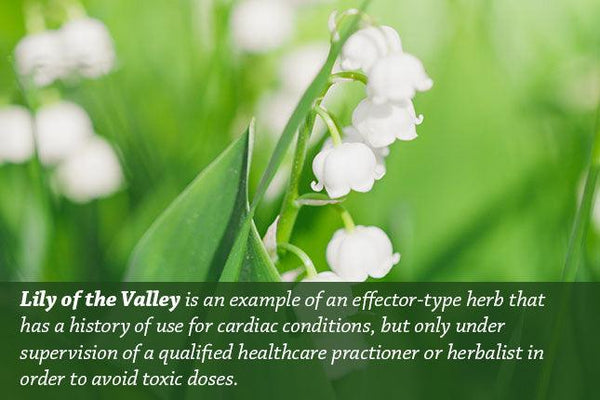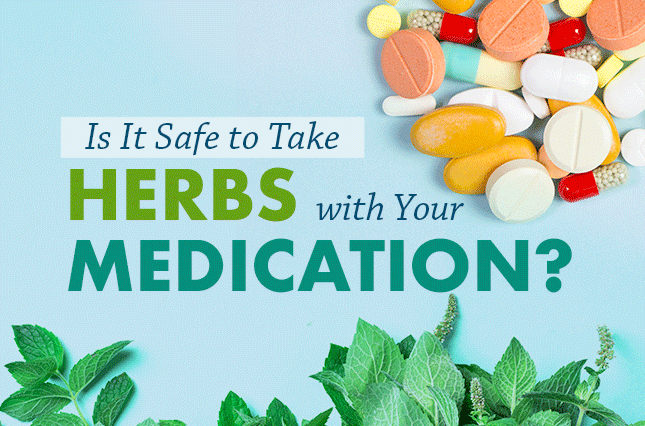The question about herbs and medication interactions comes up a lot — and for good reason. It’s good to ask questions, especially when it comes to supplements and medicine.
All prescription drugs carry risks, and even though most tend to work predictably on their own, various outside factors can interfere in adverse ways, whether in how the medication is absorbed, metabolized, or utilized.
What’s more, drug interactions can be pretty serious, even deadly. Although this can be the case for some herb-drug interactions, it’s important to understand that most herbs function very differently than drugs. And because of that, most herbs are safe to take with common medications. In some instances, herbs can even help reduce drug side effects or help you reduce the dosage of drugs.
But, like anything else, there are exceptions and caveats. Here’s what you need to know to stay healthy and safe if you’re considering combining herbal supplements and prescription medications.
Combining Drugs and Herbs - What You Need to Know
The Difference Between Drugs and Herbs
Most symptoms or illnesses result from a dysfunctional process in the body, and prescription medications are primarily designed to target those processes and interfere, disrupt, or block them. But that means drugs don’t typically address the causes of the dysfunction but rather the process that triggers it.
Take heartburn medications, for example. Rather than addressing why too much stomach acid regurgitates up into the esophagus, heartburn drugs block the natural process in the GI system that produces stomach acid in the first place. In that respect, many drugs, especially those used for chronic illnesses, are a little like low-dose poisons.
Restorative or adaptogenic herbs, on the other hand, don’t block those processes. Instead, herbs regulate or balance the systems that create those processes, essentially addressing underlying causes.
To simplify all the more - drugs target symptoms by interfering with body processes; herbs balance systems by addressing causes of body processes.
Why Choose Herbs At All?
Restorative herbs help improve cell communication, stimulate healthier digestion, and balance the gut’s microbiome. Many also have anti-inflammatory and antioxidant properties that will enhance how cells in the immune system communicate.

So, rather than putting out the flame of overactive inflammation (like an anti-inflammatory drug would,) herbs help you avoid faulty inflammation-triggering signals and reduce the free radicals that can lead to overactive inflammation in the first place.
Herbs Take Time But Are Worth The Wait
While this process delivers longer-lasting benefits, it also takes longer to go into effect, so herbs don’t usually provide the quick fix that some drugs can. If you can find the patience to allow herbs to work their magic, you can help the cause, not just treat the symptom.
Herbs are Generally Safer vs. Perscription Medications
Another magical characteristic of herbs is that they generally have a high safety profile. Few herbal substances can kill you, even if taken in large quantities. Herbs have evolved for the specific purpose of supporting cellular life and natural functioning. That’s in contrast to many prescription medications out there, which, if you take too much, can quickly turn lethal.
Effector Herbs Versus Restorative Herbs
As with all rules, some exceptions exist to the abovementioned herb-drug differences. For instance, some herbs work more like drugs - called effector herbs; they produce an acute effect on natural body processes.
The results of effector herbs are powerful but also usually short-lived and with no long-term healing properties. That’s different from restorative or adaptogenic herbs, which generally balance cellular functioning and communication and support healthy body processes in the long term.

Effector herbs also tend to have one specific ability or target, while adaptogens generally support and balance all your systems and are more gentle in their effects.
Here’s a simple example to understand the difference:
Say you’re carrying a heavy bag and are in pain. Like a drug, an effector herb could temporarily knock out or reduce pain signals. Adaptogenic herbs, on the other hand, would support your muscles and joints to correct your posture and support your heart and immune health so you could better carry the load without injury and fatigue in the future.
Many herbalists tend to steer clear of effector herbs for the mere fact that they are so powerful and can be potentially dangerous when combined with certain drugs or taken in high doses.
Be Careful with Certain Medications
Although most herbs are safe to take with medications, some drugs require special consideration. Take note if you are prescribed any of the drugs below — it’s not an exhaustive list, but it’s a good overview of Rx categories that can interact with herbs. As always, talk to your doctor before starting any new herbal regimen.

SSRI Antidepressants
Restorative herbs typically don’t interfere with medications — they can be beneficial — but steer clear of the effector herb St. John’s wort. It blocks serotonin enzymes and may interfere with serotonin reuptake, which is what selective serotonin reuptake inhibitors (SSRIs) do. If taken together, too much serotonin could build up in your body and trigger serotonin syndrome, which can cause sweating, agitation, confusion, headache, and other scary side effects.
Prescription Sedatives, Sleep Aids, and Anti-Anxiety Medicines
Many herbs have calming and sedative properties, including strong effector herbs like kava, valerian, and belladonna, and milder adaptogens such as bacopa, passionflower, and motherwort.
While the vast majority of calming herbs work like a feather compared to their hammer-like drug counterparts, it’s still best to avoid mixing the two, especially in the case of effector herbs, which are especially potent.
Blood Thinners
Many herbs, as well as omega-3 fatty acids found in krill oil and fish oil supplements, have mild platelet-inhibition properties, meaning they can keep platelets from sticking together and slow down the mechanism that forms blood clots.
That can be good for most people because it helps prevent plaque formation in arteries and decreases the risk of blockages. However, if you’re on blood thinners, even the mild effect from herbs could thin the blood too much, causing blood vessels to become leaky and increasing your risk of hemorrhagic stroke or other complications.
Thyroid Hormone
Ashwagandha is known to support and stimulate thyroid function, so if you’re also taking a thyroid hormone, the herb could bump you up to a higher-than-normal hormone level.
If you take both ashwagandha and thyroid hormone, have your levels tested, as you may be able to lower your dosage of the synthetic drug.
Diabetes Medications or Drugs that Lower Blood Sugar
Most adaptogen herbs, including reishi, rhodiola, and andrographis, naturally help balance blood sugar. If you take these herbs along with glucose-lowering meds, it may cause levels to dip below average.
As with thyroid drugs, rather than avoiding herbs, consider working with your doctor to see if they might enable you to lower your dosage of drugs.
Smart Reasons to Take Herbs with Medications
If your healthcare professional isn’t knowledgeable about herbs, they may be inclined to simply tell you to stop taking herbs or avoid them altogether. But in many cases, there’s no reason you can’t take most adaptogen or restorative herbs — the best of which include rhodiola, reishi, cordyceps, ashwagandha, and andrographis – with your prescription.

Even herbs that have mild effects similar to that of a drug you’ve been prescribed — like those that lower blood sugar or thin the blood — can be okay. After all, herbs naturally support your body’s systems, improve functioning, and help address the causes of illness.
Herbs Can Ease Your Prescriptions Side Effects
Adaptogenic herbs can moderate the side effects of many drugs and work in tandem in other ways. For instance, one of the main benefits of these herbs is their ability to help balance the gut’s microbiome and support a healthy immune system, making them an excellent complement to antibiotics for an infection, which can throw the microbiome out of whack.
Herbs - A Long-Term Solution And Potential Alternative
Why not take the herb and lower the dose of the drug, then monitor your response to find the right balance? In the long term, that’s preferable to relying on drugs that only target a symptom and must be taken forever, anyway.
What’s more, when paired with particular lifestyle and dietary changes, you may even be able to get off the drug completely. Just note that this approach can require finding an open-minded doctor and/or a knowledgeable herbalist who can work together to guide you through the proper steps.

If you’re ready to add herbs to your health routine but not sure where to start, try taking our Vital Planner quiz. In just 2-3 minutes, our quiz will recommend a personalized herbal supplement plan based on your health goals.



